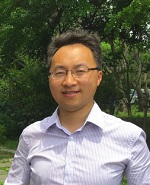 |
胡光明博士 PhD (CUHK) 導師 |
電郵: Email住址會使用灌水程式保護機制。你需要啟動Javascript才能觀看它 電話: (852) 3400 8953 傳真: (852) 2334 3747 辦公室: 香港九龍紅磡香港理工大學 何鴻燊樓HJ609室 |
Biographical Sketch/簡介
胡光明博士畢業於香港中文大學中國語言及文學系,獲哲學博士學位,此前先後受教於中國青年政治學院新聞與傳播系、北京大學中國語言文學系。胡博士專攻中國古代文學,研究領域包括中國古代戲曲小說的發展、明清文學與文化、宮廷戲曲與政治文化等方面。
Academic Qualifications/學歷
- Ph.D (2014), Chinese Language and Literature, The Chinese University of Hong Kong.(香港中文大學中國語言及文學系,哲學博士)
- M.A. (2011), Chinese Language and Literature, Peking University.(北京大學中國語言文學系,文學碩士)
- B. A. (2007), Journalism and Communication, China Youth University of Political Sciences.(中國青年政治學院新聞與傳播系,文學學士)
Present Positions/現任
- Instructor, Department of Chinese Culture, The Hong Kong Polytechnic University (2016.8-) 香港理工大學中國文化學系導師
Positions Held/曾任
- Research Assistant, Department of Chinese Language and Literature, The Chinese University of Hong Kong (2016.1-2016.6) 香港中文大學中國語言及文學系研究助理
- Assistant Lecturer, School of Languages and General Education, Technological and Higher Education Institution of Hong Kong (2015.9-2015.12) 香港高等教育科技學院語文及通識教育學院助理講師
- Research Assistant, Department of Chinese Culture, The Hong Kong Polytechnic University (2014.10-2015.8) 香港理工大學中國文化學系研究助理
Major Fellowship and Teaching Award/主要教研獲獎
- 香港中文大學洽蕙短期進修研究贊助金(Hop Wai Short-term Research Grant 2012/13).
- 北京大學第四屆孟二冬教授紀念論文獎(The Fourth Annual Academic Award in Commemoration of Professor Meng Erdong, 2010, Peking University)
Publications/出版著作
- 胡光明,〈戊戌變法與皮簧本《昭代簫韶》的改編演出〉(The Hundred Days Reform in 1898 and The Performance of The Glorious Music of a Brilliant Age in Peking Opera version)。《戲曲研究》,輯90(2014年3月),頁180-198。
- 胡光明,〈戲劇與權力之間:《昭代簫韶》中的君臣與神道書寫〉(Court Theatre and Imperial Power: the Writing of Monarch Relations and Immortals in the Grand Theatre Zhaodai xiaoshao [The Glorious Music of a Brilliant Age])。香港中文大學中國語言及文學系編,《明清研究論叢》(第二輯),上海:上海古籍出版社,2015年11月,頁179-213。
- 胡光明,〈形制與意義:《昭代簫韶》演出考〉(Format and Connotation: the Performance History of the Grand Theatre Zhaodai xiaoshao [The Glorious Music of a Brilliant Age])。故宮博物院編,《清風雅韻:清代宮廷戲曲學術研討會論文集》,北京:故宮出版社,2015年9月,頁372-395。
- 胡光明,〈明傳奇《祥麟現》版本考論〉(A Study of Editions of Xianglinxian)。《戲曲與俗文學研究》, 第六輯(2018年12月),頁92-106.
- 古籍整理:[明]姚子翼,胡光明點校,《祥麟現》,廖可斌主編,《稀見明代戲曲叢刊》,第五卷,上海:東方出版中心,2018年。
Conference Papers and Presentations/學術會議論文與報告
- 〈 鍾馗戲的傳統與新變:論清代宮廷戲曲中的「驅祟」、「賜福」與「嫁妹」〉(The Tradition and Transformation: A Study on the Zhong Kui Drama in the Qing Court Theatre), International Conference on Chinese Classical Drama and Traditional Culture 溫故知新:中國古典戲曲與傳統文化國際學術研討會. April 19-21, 2019. Faculty of Arts, Nanjing University.
- 〈文氏家慶:儀式、習俗與清宮月令承應戲中的文士〉(Wen Shi Jia Qing: Rituals, Customs and the Scholars’ Image in the Qing Court Theatre of the Traditional Festival). The Second International Conference on Chinese Drama and Popular Literature 第二屆戲曲與俗文學研究國際學術研討會. July 17-19, 2018. Department of Chinese, Sun Yat-sen University.
- 〈《儒林外史》的當代戲曲改編:論京劇《范進中舉》和評劇《牛布衣》〉(The Contemporary Traditional Theatre Adaptation of Rulin waishi: A Study of Peking Opera Fanjin zhongju and Pingju Opera Niubuyi). The Academic Symposm on Rulin waishi and Chinese Culture 《儒林外史》與中國傳統文化學術研討會. July 7-9, 2017. Huaihua College.
- 〈聚焦寧壽宮:乾隆帝與清代內廷演劇的空間權力及文化寓意〉(Focus on the Palace of Tranquil Longevity [Ningshou gong]: Emperor Qianlong, the Space Power and the Culture of the inner Court Theatre). Young Scholars’ Forum in Chinese Studies, 19-21 May 2016, Institute of Chinese Studies, The Chinese University of Hong Kong.
- 〈權力與戲劇的互動:清代宮廷演劇的制度變遷及戲劇管理〉(Interaction between Imperial Power and Drama: Institutional Evolution and Administration Mechanism of the Qing Court Theatre). Young Scholars’ Forum in Chinese Studies, 18-20 June 2014, Institute of Chinese Studies, The Chinese University of Hong Kong.
- 〈「一枕南柯夢」:論《昊天塔》傳奇的英雄悲劇〉(The Nanke Dream: A Study of the Hero and Tragedy in the Drama Haotianta ). The Eighth Annual Conference: The Asian Studies Association of Hong Kong (ASAHK) 香港亞洲研究學會第八屆研討會. 8-9 March 2013. The Hong Kong Institute of Education.




